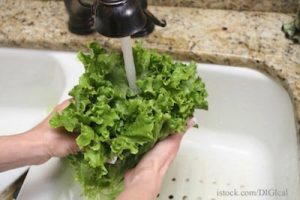If you’re like most people, you wash your produce before eating it. But do you dry it? You should, according to the U.S. Food and Drug Administration (FDA).
 Hundreds of people in six states; Illinois, Iowa, Kansas, Nebraska, Texas and Wisconsin have been sickened by a single-cell parasite called Cyclospora. To reduce your risk of food poisoning form fresh produce the FDA recommends the following produce-washing tips. Before you begin, wash your hands with hot, soapy water for 20 seconds, or long enough to sing Happy Birthday twice. Wash produce under cool, running water. Do not use soap or commercial washes. Scrub firm produce such as melons, cucumbers and potatoes with a brush. Dry the produce with a clean cloth or paper towel. Following these recommendations will reduce but not completely eliminate the risk of food poisoning from bacteria or parasites.
Hundreds of people in six states; Illinois, Iowa, Kansas, Nebraska, Texas and Wisconsin have been sickened by a single-cell parasite called Cyclospora. To reduce your risk of food poisoning form fresh produce the FDA recommends the following produce-washing tips. Before you begin, wash your hands with hot, soapy water for 20 seconds, or long enough to sing Happy Birthday twice. Wash produce under cool, running water. Do not use soap or commercial washes. Scrub firm produce such as melons, cucumbers and potatoes with a brush. Dry the produce with a clean cloth or paper towel. Following these recommendations will reduce but not completely eliminate the risk of food poisoning from bacteria or parasites.
People become infected with Cyclospora when they eat or drink food or water that is contaminated with microscopic amounts of fecal matter containing the parasite. Cyclospora is most commonly found in tropical climates but imported foods including mesclun lettuce, basil, snow peas, and raspberries have been the source of a number of U.S. outbreaks in recent years.
Symptoms of a Cyclospora infection include watery or explosive diarrhea, nausea, vomiting, bloating, gassiness, abdominal cramps, weight loss, loss of appetite, low-grade fever, fatigue and malaise. These symptoms, which can persist for up to two months, can cause dehydration. See a doctor if you have had these symptoms for more than a few days especially if you have sunken eyes, reduced urine output, reduced tear production or dry mouth or tongue, which are symptoms of dehydration.




